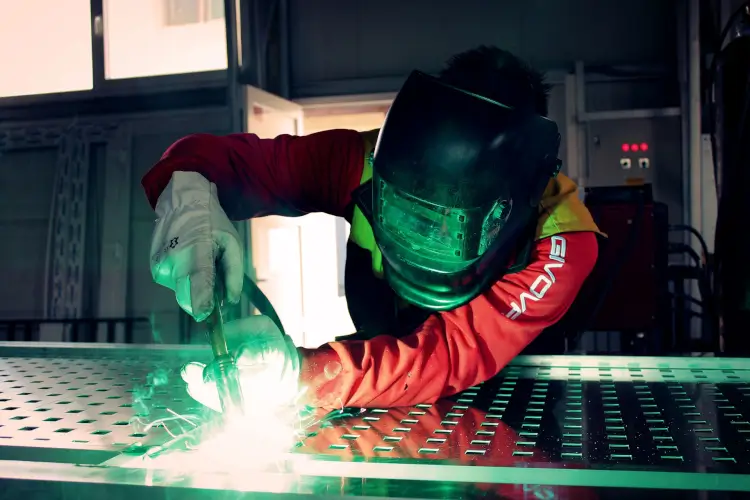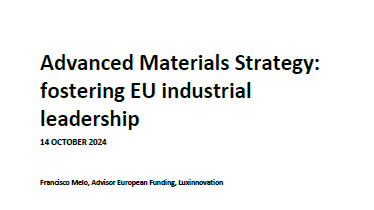


A new Luxinnovation report aims to help advanced material researchers and innovators align their work with current European policies and initiatives.
 Abigail Okorodus
Abigail Okorodus
Advanced materials are critical for European autonomy and competitiveness. These innovative resources, such as nanomaterials or composites, are instrumental to the green and digital transition in Europe. In simple terms, advanced materials can be seen as an upgrade for raw materials, as they come with cutting-edge properties and utilise techniques that meet the needs of modern industries while conserving our natural assets.
Advanced materials are one of the hottest topics in European research and innovation.
Francisco Melo, Luxinnovation
This report put together by the national innovation agency offers an in-depth look at wider European policy goals, key challenges facing the sector, and potential solutions. Specifically, it demonstrates how the European Commission’s communication “Advanced Materials for Industrial Leadership” offers a strategic framework to overcome identified challenges.
“Advanced materials are one of the hottest topics in European research and innovation with numerous political, legislative and strategic initiatives undertaken by the European Union, which can be difficult for the main target audiences in research and industry to follow. Therefore, we decided to come up with this report in order to provide our R&D community with a guidance document that shows a clear overview of the key policies and initiatives at this level,” explains Francisco Melo, Advisor European Funding at Luxinnovation.
The demand for advanced materials is expected to significantly increase in the coming years, impacting sectors such as renewable energy production, battery development, zero-emission buildings, semiconductors, medical devices, satellites, and aviation. Nevertheless, the report notes challenges that could impede progress based on findings from two key studies: the Industrial R&D&I investments and market analysis in advanced materials prepared by independent experts for the European Commission and the Materials 2030 Roadmap co-created by the signatories of the Materials 2030 Manifesto, relevant European Technology Platforms and the Energy Materials Industrial Initiative (EMIRI6).
These include:
In the first quarter of 2024, the European Commission released the publication on Advanced Materials for Industrial Leadership. “This is the main document on this subject as it offers a strategic framework designed to tackle the main research and innovation challenges previously identified,” mentions Mr Melo.
The strategy is built on five critical pillars that include enhancing European research and innovation for advanced materials, fast-tracking the transition from lab research to industrial application, increasing capital investment and access to finance, fostering the production and use of advanced materials, and establishing a coordinated governance structure.
It offers a strategic framework designed to tackle the main research and innovation challenges.
“I believe that this report explains clearly how each one of the pillars contributes with concrete actions and initiatives to tackle each one of the research and innovation challenges, ensuring that the necessary resources and support are available for groundbreaking advancements in the field of advanced materials,” he adds.
The Materials Research and Technology department at the Luxembourg Institute of Science and Technology (LIST) carries out application-driven research in the field of advanced materials. Among its innovative projects are those aimed at creating conducive conditions for the uptake of adhesive-free engineered wood products and producing a new generation of reinforced cellulose fibres for 3D-printed composites, among others.
“LIST is one of the main research actors in Luxembourg dealing with advanced materials. They have a dedicated department, and, like other research centres, they submit competitive proposals at national and international levels to advance their research” points out Mr Melo.
It will allow our stakeholders, from research to industry, to align their work with current political priorities and funding opportunities.
Horizon Europe, the EU's key funding programme for research and innovation, is increasingly funding research on advanced materials, in particular under Cluster 4 (digital, industry and space). Likewise, the European Innovation Council, Europe’s flagship innovation programme to develop and scale up breakthrough technologies, also prioritises the advancement of materials. “These are good examples of how a specific political priority is reflected in targeted and tailored funding opportunities in this field,” he adds.
This report on advanced materials comes at a critical time as it allows the research and innovation community to have a solid and organised overview of the main initiatives and developments in advanced materials. “But beyond this, it will allow our stakeholders, from research to industry, to align their work with current political priorities and funding opportunities. It also makes it possible for them to anticipate future trends and new associated lines of research and innovation, and identify collaboration opportunities in this area,” he concludes.
